|
Sample of Previous
Projects
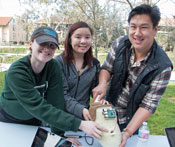
Monitoring when to add or remove a sock
(2017) |
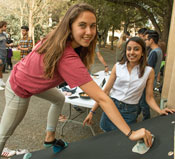
Climbing wall for the Magical Bridge Playground
(2017) |
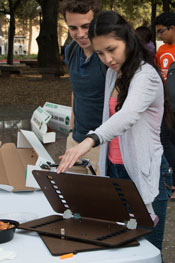
Drawing tool for artists with developmental disabilities
(2017) |
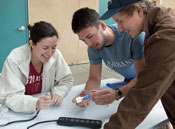
Making it easier to handle plugs (2017) |

Talking animals for Magical Bridge Playground
(2017) |
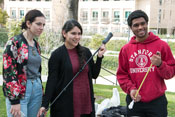
Walking stick picks up small objects on the ground
(2017) |
More Projects |
|
Perspectives in Assistive
Technology is a Winter Quarter course that explores issues
surrounding the design and use of technology that benefits people with
disabilities and older adults.
This three-credit course
consists of semi-weekly presentations by guest lecturers and tours of local
medical facilities and engineering labs. Students pursue team-based projects
that address problems faced by users of assistive technology.
Lectures are
open to all students and community members.
For students whose schedule does not permit working on a team-based
project, one-unit lecture-only options are offered. ENGR110 is a
certified Service Learning course that satisfies the optional course
requirement for the BSME degree and is an approved course for the Program in
Science, Technology & Society, the Learning, Design & Technology
Program in the Graduate School of Education, and the Program in Human
Biology.
The course objectives
are to:
-
Expose students
to the engineering, medical, and social issues facing engineers, researchers,
entrepreneurs, clinicians, older adults, and individuals with disabilities in
the design, development, and use of assistive technology
-
Engage students
in a team-based project experience that exercises team working skills
(leadership & organization) and applies an engineering design process to
tackle difficulties experienced by individuals with disabilities and older
adults
-
Provide an
opportunity for students to interact with users of assistive technology in the
local community along with health care professionals, coaches, and project
partners
-
Enhance
students’ problem solving, critical thinking, and communication skills
through in-class discussions, report writing, and project
presentations
-
Encourage
students to apply their engineering skills and design expertise to help
individuals with disabilities and older adults increase their independence and
improve their quality of life
After taking the
course students will:
-
have a deep
appreciation of the engineering, medical, and social issues facing engineers,
researchers, entrepreneurs, clinicians, older adults, and individuals with
disabilities in the design, development, and use of assistive
technology
-
be able to
interact with users of assistive technology in the local community along with
health care professionals, coaches, and project partners
-
be able to
utilize practiced engineering skills and design expertise and apply an
engineering design process
-
be able to
exercise team working, prototype fabrication, and design analysis
skills
-
be able to employ
enhanced critical thinking and communication (writing and presentation)
skills
Students should
enroll in this course if they:
-
have an ongoing
interest in exploring the design, development, and use of technology that
benefits people with disability and older adults
-
would like to
work on an assistive technology project that addresses a challenge experienced
by another student, family member, or friend
-
want to gain
confidence in their ability to apply Stanford-acquired knowledge and skills to
address real problems
Students can
pursue further prototyping, fabrication, user testing, and iterative design for
credit in the Spring Quarter as an independent study project.
For more information, see the
course syllabus. |